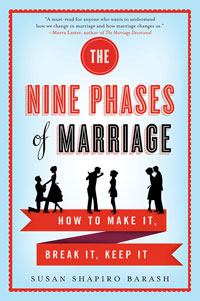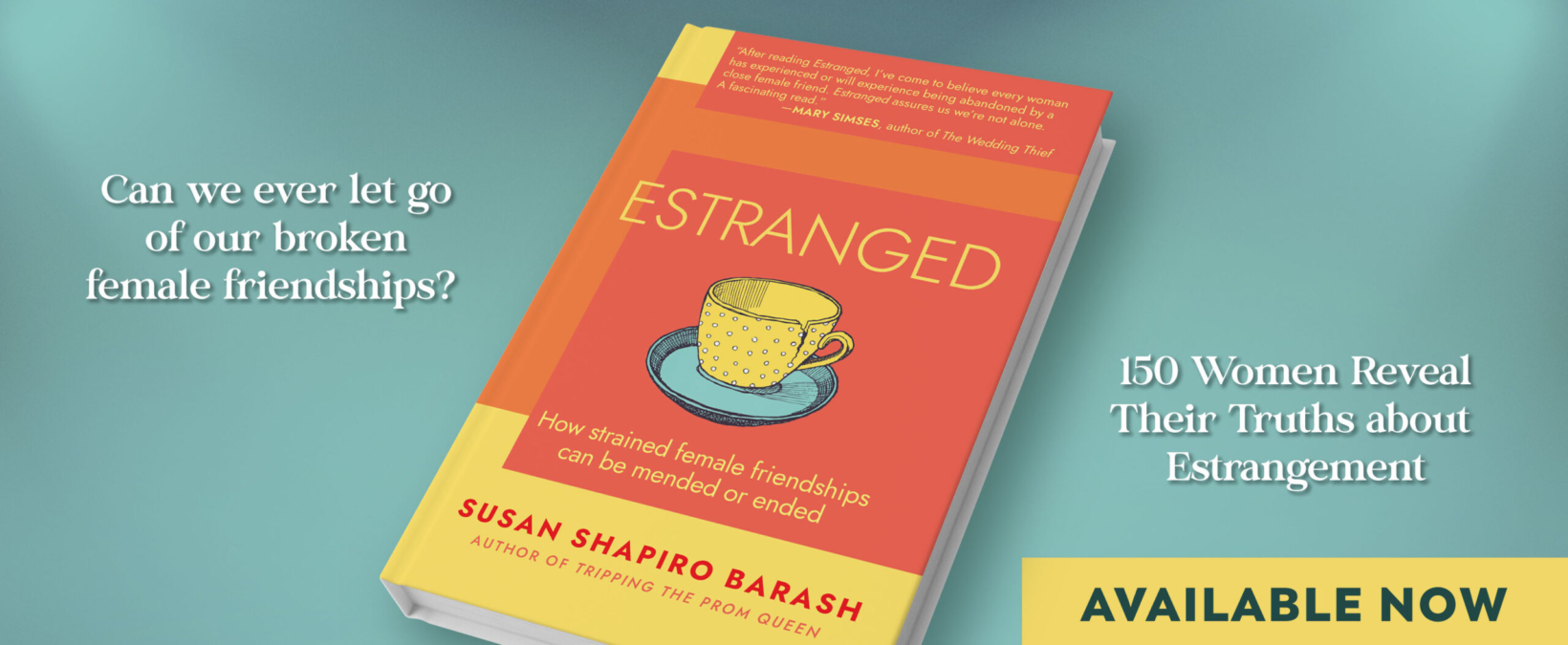 In THE NINE PHASES OF MARRIAGE, Barash offers us a groundbreaking look at how to understand your marriage and create a more satisfying relationship.
In THE NINE PHASES OF MARRIAGE, Barash offers us a groundbreaking look at how to understand your marriage and create a more satisfying relationship.
Barash chronicles the true confessions of women who have been through it all – including marriage, childbearing and rearing, divorce, remarriage and the death of a spouse. The stages of marriage she reveals include:
- The Hopeful Bride: Eighty-five percent of women long to be married but do they want the wedding or the marriage? Celebrity culture creates an infatuation with the “perfect wedding.”
- The Perfect Wife: New wives strive to have the perfect marriage, often sacrificing their needs to make their husbands happy.
- Child-Centricity: Focusing on the children more than “the couple” can either make or break a marriage.
- Midlife Disappointment: Unhappiness and dissatisfaction in the marriage creeps in at some point for 70 percent of wives.
- Loss of Closeness and Infidelity: Most women who cheat feel they are entitled to the affair after doing all they could to keep the marriage together, with little in return.
- A Second Chance at Love: Most women feel there are better options than their current spouse. High School reunions, Facebook and other technologies make it easy for husbands and wives to reconnect with old flames.
- Success in the Golden Years: If you haven’t given up yet, you’re most likely in it for the long haul and have learned to handle your spouse and let go of trivial conflicts.
THE NINE PHASES OF MARRIAGE explores fresh territory and exposes the truth behind how wives really feel about their marriages. It is with this essential knowledge that women can successfully navigate the natural pitfalls and perils of their marriages and embark on a true partnership.
BUY THE BOOK: amazon.com | Barnes & Noble | IndieBound.org
PRAISE
“There are so many books out there that put the onus on wives to spice up the marriage. I love that Barash encourages women in this book to tune into their complex feelings, sort through them, and make choices that help them feel whole as an individual, which is necessary for any healthy relationship.”
-Michelle Cove, Author of I Love Mondays: And other confessions from devoted working moms
“The Nine Phases of Marriage is a must-read for anyone who wants to understand how we change in marriage and how marriage changes us. Author Susan Shapiro Barash has seamlessly integrated her insights as a gender expert with anecdotal material from interviewees to create a fascinating read that examines the phases of marriage. In the process, she creates a fascinating lens through which readers can see how some marriages break while others remain buoyant over a lifetime.”
-Meera Lester, author of The Marriage Devotional, 365 Simple Ways to Celebrate Your Love and The Secret Power of You
“Marriage is unique journey for every couple that begins with the promise of ‘happily ever after’ yet oftentimes leaves partners feeling lost along the way. In her newest book, The Nine Phases of Marriage, Susan Shapiro Barash captures the reality of a lasting relationship and imparts the insight, understanding and most essentially the skills that will enable you to enhance your connection with your spouse and keep the fairy tale alive.”
-Dr. Jane Greer, marriage therapist and author of What About Me? Stop Selfishness From Ruining Your Relationship
“The Nine Phases of Marriage…How to Make It, Break It, Keep It is a sharply observed yet accessible analysis of the constantly evolving organism that is contemporary marriage. As Susan Shapiro Barash parses every phase, I defy a married reader to resist trying to locate herself on this map. Many, I predict, will shout ‘game-change!’ as they attempt to follow the author’s smart advice.”
-Sally Koslow, author of Slouching Toward Adulthood: Observations from the Not-So-Empty Nest
READERS’ GUIDE
1. The author describes nine phases of marriage. Which phases resonate for you as a wife and why?
2. In her preface, Barash states that women highly value being a wife and that for many, it is a big piece of their identity. Do you agree or disagree with this, and do you find that it applies to you?
3. Eighty percent of the wives in Barash’s study have based their marriages on romantic love. Have you married for this reason and would you encourage a daughter, a sister, or a friend to do the same?
4. If money issues affect most marriages, how do you feel that it works in your marriage, and has this changed over time?
5. Discuss why and how a wife may lose her self-esteem in a marriage. Do you feel that your husband is controlling and/or critical, and were you aware of this at the beginning of the marriage?
6. The author found that when wives communicated their needs to their husbands, this improved the situation. Yet many women expected that their husbands could anticipate their desires and were upset with having to spell it out. Has this been your experience?
7. While most women agree that having children has changed their marriages, there are those who feel this has enriched the relationship and those who feel it has stressed their marriages. Where do you fit in?
8. The author cites frictions in a marriage, including finances, children, in-laws, demands of work, lifestyle choices. Which of these are applicable to your marriage?
9. In the middle of the book, Barash takes a look at how distance between partners creeps into the marriage. For some wives, it’s about conflict; for others, it’s about what is missing emotionally and/or physically. Do you feel that your marriage is at this stage or that it could occur in the future?
10. Define the author’s interpretation of “happily married.” Do you believe that after a certain number of years as a wife, this definition changes?
11. What are your thoughts on the author’s advice on trial separations? What do you believe we owe to ourselves if we are dissatisfied in a marriage, and what do we owe to our husbands and to the relationship itself?
12. What do you think of Barash’s findings on midlife divorce? She details how some wives have fallen out of love, others feel that children have taken up too much of the relationship. She writes that wives may embark on an affair or the husband might be having an affair. What scenario in your marriage would precipitate divorce?
13. In Phase Seven, Barash investigates “second chances” in a marriage. Some wives renegotiate their marriages, others divorce, some divorce and remarry. What is your impression of how wives make this decision? Do you identify more with the wife who will stay in her marriage and take the steps to save it, or the wife who moves on?
14. Are there parts of this book that you would recommend to a friend, sister, or daughter as she contemplates her dissatisfaction in her marriage?
15. The author’s intent is to help us recognize the experiences we have per the nine phases of marriage. Throughout, despite the obstacles, Barash underscores how much women value the role of wife and want their marriages to be successful. Does this give you insight into your own marriage and a better understanding of what to expect?


